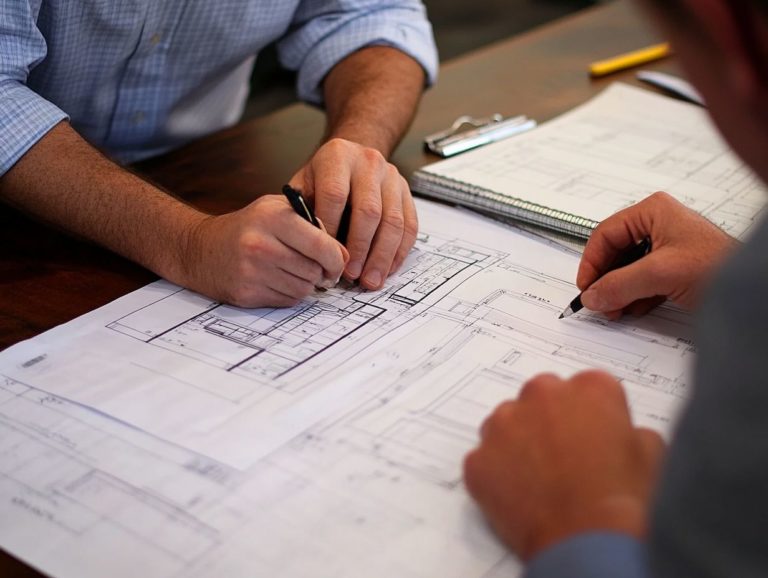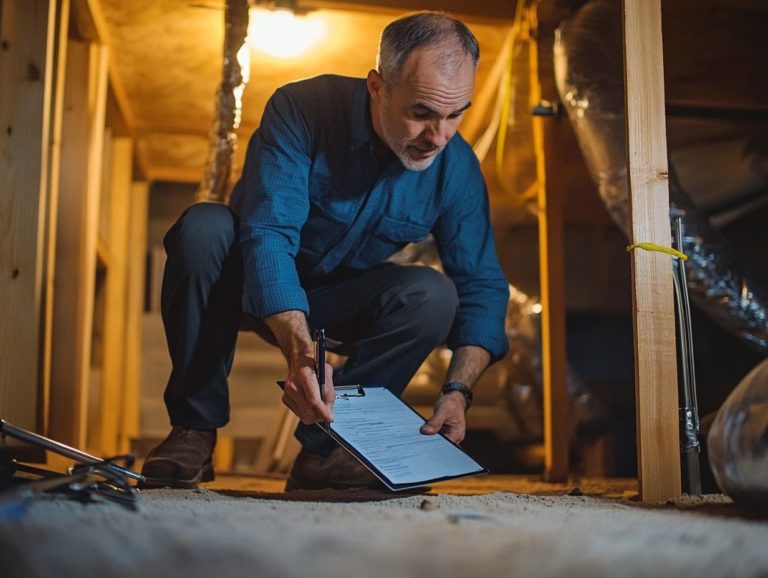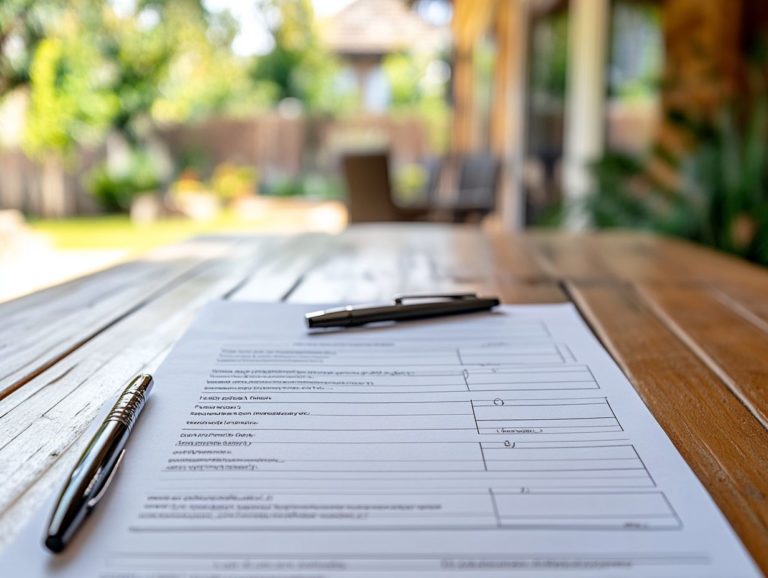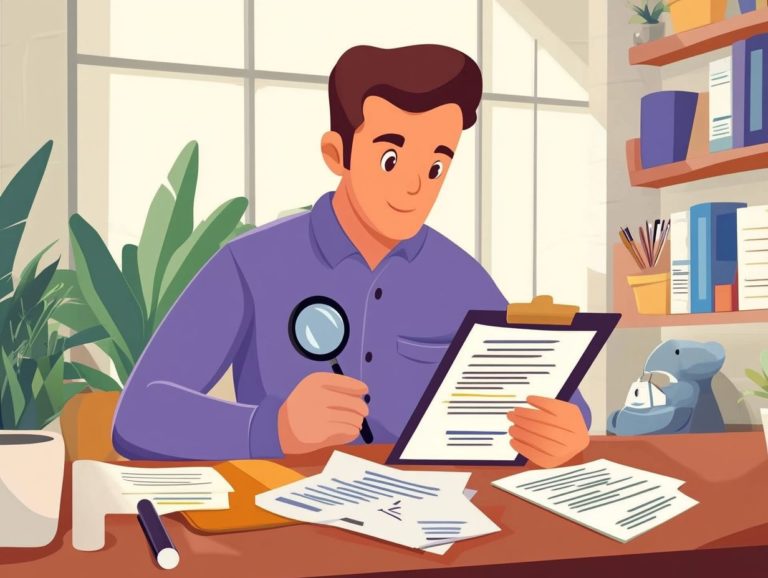The Role of Home Inspections in Real Estate
When you re buying or selling a home, it s easy to get swept up in the moment and overlook a vital step: the home inspection. This process protects your investment and uncovers potential issues that could lead to costly repairs later.
This article will navigate essential facets of home inspections. It empowers you to make informed decisions on your real estate journey.
Contents
Key Takeaways:

Home inspections are crucial for buyers and sellers as they reveal potential issues and save money in the long run. A thorough inspection evaluates areas like the roof, foundation, plumbing, and electrical systems.
When choosing a home inspector, consider their qualifications and ask important questions to ensure a thorough inspection.
The Importance of Home Inspections
Home inspections are essential in real estate transactions. They deliver a comprehensive assessment of the property’s condition and protect both buyers and sellers, highlighting the role of home inspections in the process.
A meticulous home inspection empowers you as a buyer to identify serious issues and understand seller expectations. It also helps you create effective negotiation strategies.
This crucial step ensures that both parties are aware of any safety concerns or essential repairs required before finalizing the Home Purchase Agreement.
Why They Are Necessary for Real Estate Transactions
Home inspections provide critical insights into the property’s condition that can impact your home-buying experience. They allow sellers to set realistic expectations regarding pricing and necessary repairs, highlighting the value of home inspections for real estate agents, paving the way for a smoother transaction.
Identifying potential issues upfront can save you from unexpected costs in the future, cultivating trust among all parties. This openness benefits you; it enables sellers to anticipate complications that might surface during negotiations, while you, as a buyer, can feel confident in your investment.
Incorporating an inspection contingency clause in your Home Purchase Agreement is a wise move. This crucial step protects your interests by ensuring that any concerning findings are addressed before you finalize the deal.
What Home Inspectors Look For
Home inspectors conduct a thorough evaluation of key aspects of a property to guarantee its safety and functionality during the inspection process. They pay particular attention to critical areas, including:
- Structural components
- Electrical systems
- Plumbing issues
Every detail is meticulously examined to ensure safety and functionality.
Common Areas of Inspection
During a home inspection, you ll want to pay close attention to several critical areas, including the roof, foundation, electrical systems, plumbing, and HVAC systems. These components are essential to the overall integrity and functionality of the property.
Inspectors will examine the roof for signs of wear, leaks, or missing shingles. Overlooking these issues can result in significant water damage down the line. The foundation will be scrutinized for cracks or signs of settling, which may indicate serious structural problems.
For electrical systems, inspectors check for outdated wiring or improper connections, both of which pose safety risks. Plumbing will be assessed for leaks and adequate water pressure, ensuring everything runs smoothly and helping you avoid potential flooding. Lastly, HVAC systems will be evaluated to confirm their operational efficiency and maintenance history, both of which are crucial for your indoor comfort and energy bills.
The Home Inspection Process
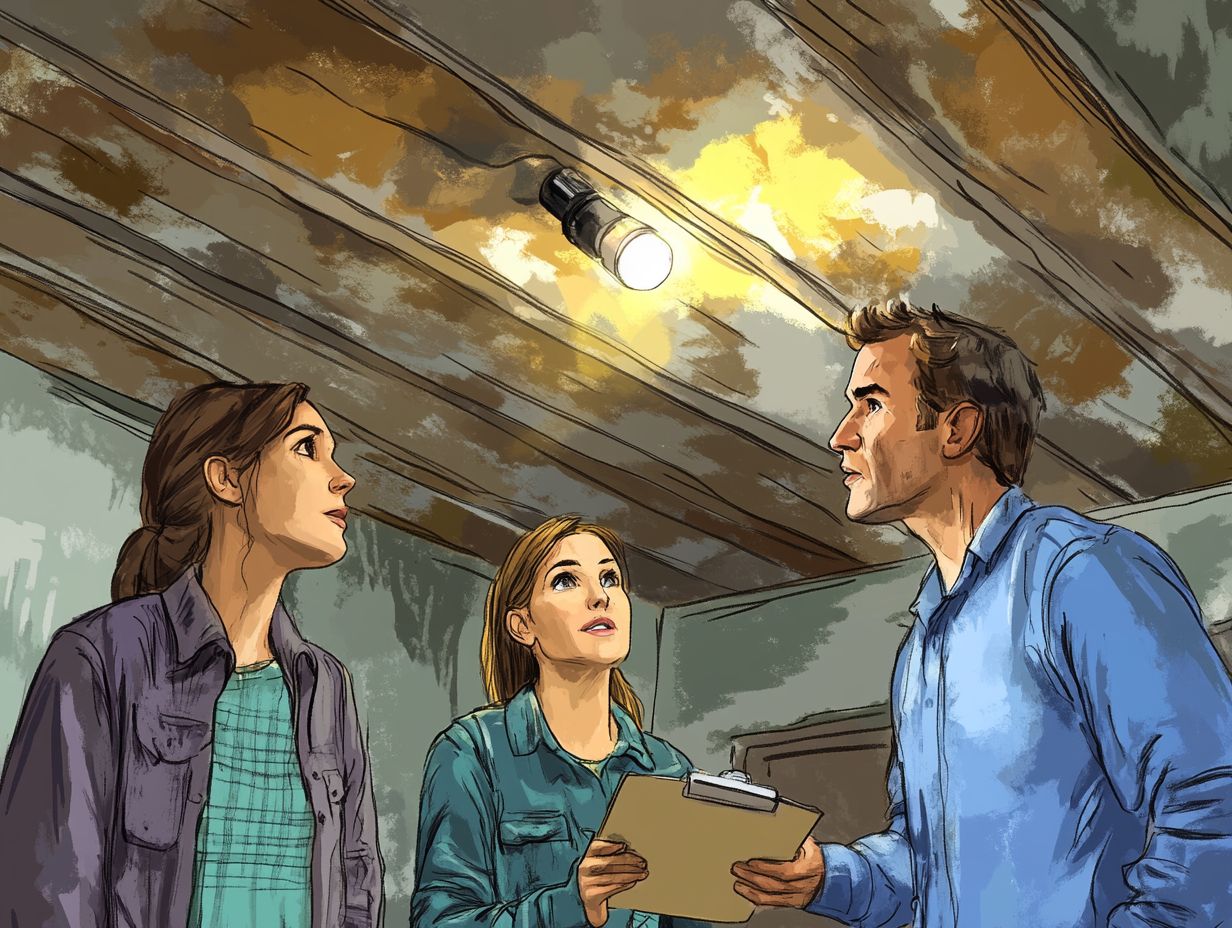
The home inspection process is a meticulous procedure that entails a comprehensive evaluation of the property. Typically spanning several hours, this process ends with a detailed report that shows findings and gives useful advice.
What to Expect During an Inspection
During an inspection, you can expect a thorough evaluation of the property, guided by the home inspector’s expertise and a well-structured checklist. This process typically encompasses both the interior and exterior of the home, diving into essential systems like plumbing, electrical systems, and heating, ventilation, and air conditioning.
Be prepared for the inspector to examine the roof and foundation carefully. They will search for any signs of damage or wear that could indicate more significant underlying issues.
To make the most of this critical step, it s wise to familiarize yourself with common concerns in your area, such as pest problems or weather-related wear and tear. Being present during the inspection allows you to ask questions and gain clarity on any concerns that may arise from the findings.
Benefits of a Home Inspection for Buyers
A home inspection presents a wealth of advantages for you as a buyer. It uncovers serious issues that might not be immediately visible, empowering you to make well-informed decisions regarding your prospective home purchase.
How it Can Save Money and Avoid Future Issues
By uncovering hidden safety concerns and offering repair recommendations, a home inspection can save you a substantial amount of money while preventing future headaches in homeownership. This vital process empowers prospective owners like yourself to identify potential issues before sealing the deal on your investment.
For example, discovering outdated wiring or plumbing can help you avoid unexpected costs down the line. Don’t let unexpected costs catch you off guard! Repairs for faulty wiring can hit your wallet hard, ranging from $1,000 to $3,000, while modernizing aging plumbing could range from $2,000 to $5,000.
And let’s not even get started on the financial strain of a damaged roof, where replacements can often exceed $10,000. Stay informed! Allocating your funds wisely can help you prioritize essential repairs and create a safer living space, ultimately fostering a sense of security in your new home.
Benefits of a Home Inspection for Sellers
For sellers, conducting a home inspection prior to listing the property offers invaluable advantages. It not only aligns your expectations with the actual conditions of the home but also paves the way for smoother transactions down the line, especially when you understand the role of agents in home inspections.
How it Can Help Sell a Home and Avoid Legal Issues

A home inspection can elevate your property marketing strategy by showcasing transparency regarding its condition. Understanding the role of a home inspector can attract more serious buyers and help you avoid potential legal pitfalls.
By providing a thorough home inspection report, you significantly enhance trust with prospective buyers. Understanding the role of home inspectors as a proactive measure streamlines negotiations by establishing realistic expectations and sets the stage for smoother transactions.
When buyers have access to comprehensive insights about the property’s condition, the chances of disputes or post-sale claims diminish, instilling a sense of security. Understanding the home inspector’s role and aligning your expectations with the inspection findings ensures that both you and the buyers are on the same wavelength, ultimately leading to a more amicable agreement.
This alignment reduces the stress typically associated with the home-buying process, making it a win-win for everyone involved.
Choosing a Home Inspector
Selecting the right home inspector is vital to your inspection process. You should take into account essential factors such as qualifications, experience, and a commitment to the standards set by reputable organizations like the American Society of Home Inspectors (ASHI).
Your choice will significantly influence the outcome of your home-buying journey. Ready to make an informed decision? Schedule your home inspection today!
What to Consider and Questions to Ask
When selecting a home inspector, consider their qualifications and experience. Ask specific questions to ensure a thorough inspection process.
A competent inspector should hold a relevant license and have completed rigorous training programs. This showcases their ability to identify potential issues within a home.
If the inspector has experience in construction or engineering, that can enhance their ability to spot underlying problems.
Inquire about the inspector’s membership in professional organizations. This usually means they keep learning and follow industry rules.
Ask about their experience with specific property types and the specialized tools they use. This gives you valuable insight into their capabilities.
Request sample reports and references right away! This is your chance to see the quality of service you’re getting.
Frequently Asked Questions
What is the role of home inspections in real estate?
The role of home inspections in real estate is to provide a thorough assessment of a property’s condition to potential buyers. This helps buyers make informed decisions and negotiate necessary repairs or adjustments to the sale price.
Who typically pays for a home inspection?
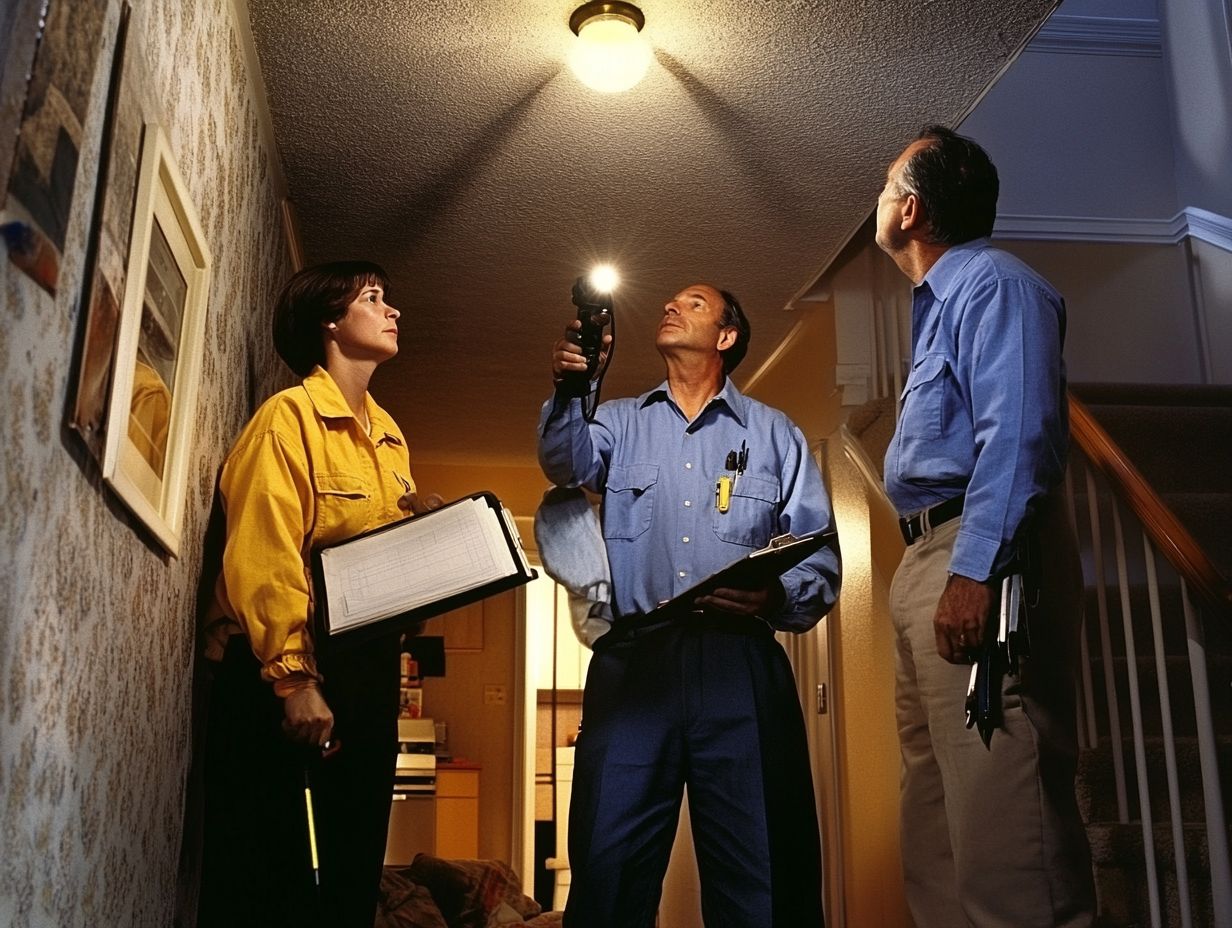
In most cases, the buyer is responsible for paying for a home inspection. However, some sellers may cover the cost to attract more buyers or show good faith in their property s condition.
What do home inspectors look for during an inspection?
Home inspectors look for potential issues or damages to the property’s structure, systems, and components. This includes the foundation, roof, plumbing, electrical systems, and more. They also check for safety hazards or code violations.
How long does a home inspection typically take?
The duration of a home inspection varies based on the property’s size and condition. On average, an inspection takes 2 to 4 hours. However, larger or older homes may require more time for a thorough check.
Do I need to be present for the home inspection?
Buyers don t have to be there, but it s a great idea! You can ask questions and learn more about any issues found during the inspection.
Can a home inspection affect the sale of a property?
Yes, a home inspection can affect the sale of a property. If significant issues are found, the buyer may renegotiate the sale price or even walk away from the deal. It’s important for both buyers and sellers to consider the results of a home inspection before moving forward with the sale.


